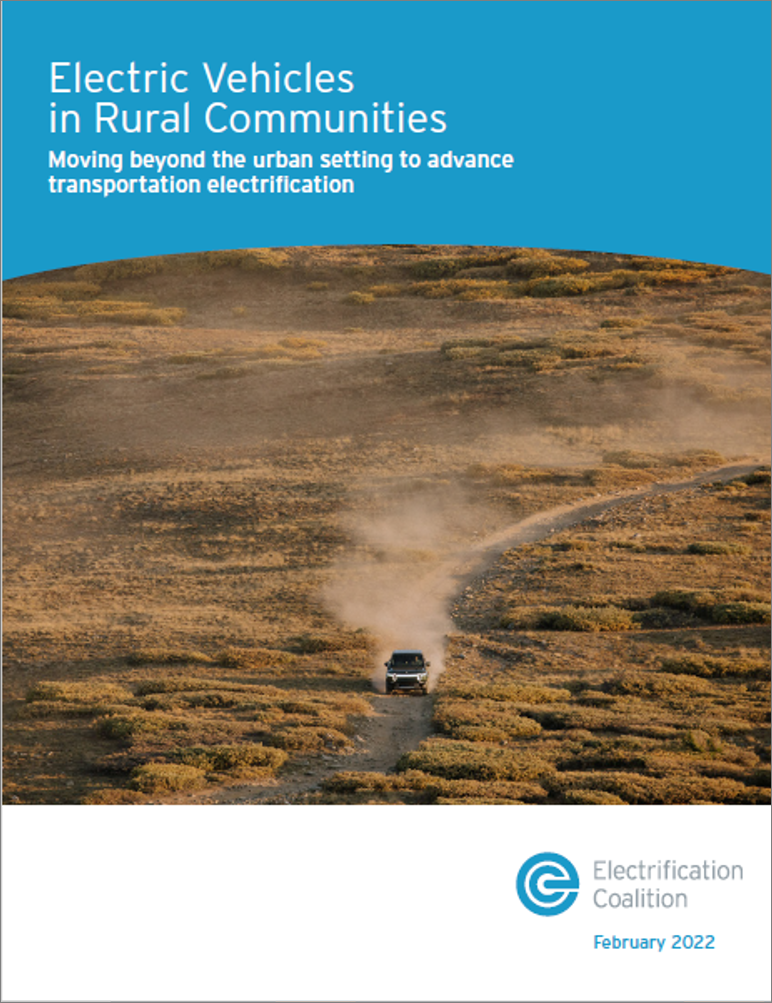New guide outlines recommendations and resources to expand EV adoption in rural communities across the country
WASHINGTON – The Electrification Coalition released a new guide for rural communities on Monday, outlining a suite of recommendations and resources that will accelerate the electrification of transportation. “Electric Vehicles in Rural Communities” identifies the most effective strategies that rural towns and counties can use to expand charging infrastructure, transition fleets to electric vehicles, support EV adoption by consumers and harness electrification as an economic development opportunity.

“The transition to an electric transportation future requires a mix of policies and actions at the federal, state and local levels,” said Katherine Stainken, senior policy director at the Electrification Coalition. “The early stages of this transformation have taken place in densely populated urban centers, where there are high concentrations of vehicles and resources. But rural communities are essential to widespread EV deployment. We need to move beyond cities to establish a nationwide network of charging infrastructure that allows all communities to take advantage of the many benefits of electric vehicles.”
The Electrification Coalition’s new guide is a resource for rural communities that are beginning or continuing their work to prepare for the arrival of electric vehicles. It covers the basics of EVs, steps to accelerate EV deployment, the benefits of EVs to rural communities, manufacturing trends, availability of models suitable for rural applications, charging infrastructure and financial resources available to support communities’ efforts.
“Rural communities can take action now to move to the forefront of this historic transformation. This collection of policies, resources and strategies can help them navigate into a new era of transportation,” Stainken said.
“Electric Vehicles in Rural Communities” is designed to serve as a companion to the U.S. Department of Transportation’s new publication, “Charging Forward: A Toolkit for Planning and Funding Rural Electric Mobility Infrastructure,” which the agency unveiled during a rural electrification webinar hosted by the Electrification Coalition on Feb. 3. The toolkit is available on USDOT’s Bipartisan Infrastructure Law website, in the Electric Vehicles section.
The Bipartisan Infrastructure Law contains $7.5 billion in new funding for EV charging stations. It makes EV charging infrastructure eligible for additional federal funding programs and provides funding for numerous other EV-related initiatives. The funding will benefit rural communities across the country by providing a ready source of capital for EV infrastructure projects.
USDOT’s new toolkit is designed to be a one-stop resource to help rural communities scope, plan and fund EV charging infrastructure. A rural stakeholder, such as a property owner, business, town or planning agency, can use the toolkit to identify key partners for a project, take advantage of relevant planning tools and identify available funding or financing to help make the project a reality.
In rural parts of the country — home to 20 percent of Americans and almost 70 percent of American road miles — EVs can be an especially attractive alternative to conventional vehicles. Rural residents drive more than their urban counterparts, spend more on vehicle fuel and maintenance, and often have fewer alternatives to driving to meet their transportation needs. Over the long run, EVs will help residents of rural areas reduce those costs and minimize the emissions impacts of transportation in their communities.
###
About the Electrification Coalition: The Electrification Coalition is a nonpartisan, nonprofit organization that advances policies and actions to facilitate the widespread adoption of plug-in electric vehicles (EVs) in order to overcome the economic, public health and national security challenges that stem from U.S. oil dependence.
